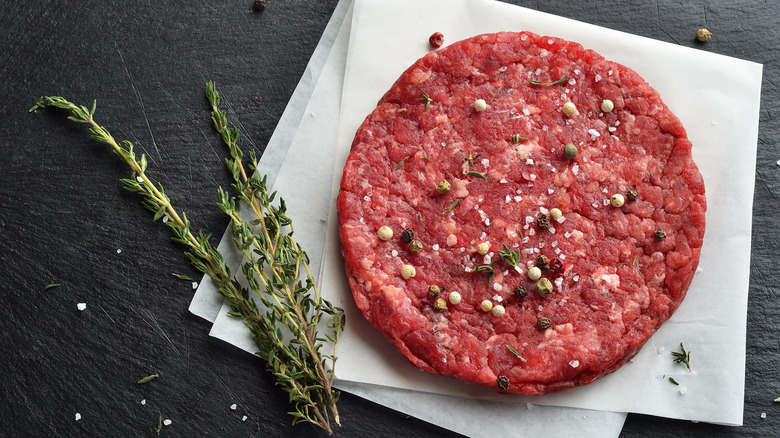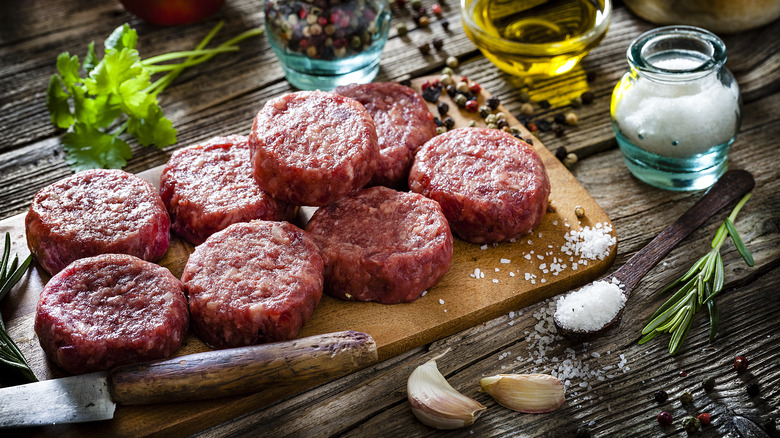Rachael Ray's Trick To Get Burger Seasoning Exactly Right
Ever since she published her first cookbook in 1999 and launched the iconic "Rachael Ray Show" in 2007, the celebrity chef has focused on providing viewers plenty of time-saving hacks and shortcuts, such as her seemingly simple but genius tip to keep eggshells out of food. Burgers are no exception as Ray has plenty of time-trimming tips for that meal, too. One of her suggestions involves testing levels of seasoning on homemade burgers by making a mini-test patty — this way, you can see if the flavor is on par or adjust before you waste time making a whole batch.
According to her advice in People magazine, Ray recommends seasoning a quarter-sized patty and searing it in a hot pan over the stovetop. Since the burger meat will cook in less than 30 seconds due to its size, you can easily check it for flavor and decide if it needs more seasoning or is okay as is. This method will also prevent you from ruining a whole patty by under-seasoning or poorly pairing spices that do not complement the burger meat.
Choose seasonings that match the flavors of your burger meat
Burgers are great canvas dishes, as they can be modified to anyone's personal preferences. Garlic and onion powder are the go-to burger seasonings for most home cooks, as they provide the perfect amount of umami flavor and won't clash with other common burger ingredients. You can add more complexity to burger patties with fresh herbs, spice rubs, and even Worcestershire sauce. Most of the time, however, a generous sprinkle of salt and pepper is all you need to season a burger.
However, there are always extra ingredients that should never be added to burger meat, and seasonings are no exception to that rule. You never want to pair strong aromatics with subtle ones, such as garlic and dill, as one could easy mask the other and result in a loss of flavor complexity.
Should you choose to add any extra herbs, spices, or sauces to your burger, first think strategically about what flavors go together with the meat. Some patties are leaner than others, and many are not made with beef or any sort of meat for that matter. Burgers made out of lamb, for example, benefit best from herbs like thyme or rosemary, which bring out the patty's gamey flavors. Turkey burgers, on the other hand, are much more subdued in taste, and benefit best from the kick of paprika or chili powder. Ray's tip comes in handy here, too, as you can trial run different combinations in a mini-burger before committing and cooking.
There's a best time to season your burger
While seasoning your burger meat before working it into a patty allows you to mix in solid ingredients, such as minced onion and garlic, it also comes with a number of downsides. You must be gentle when incorporating these ingredients into the patties, as over-handling ground meat will mess with the proteins and create a dry, tough burger. Salting ground meat in advance can also dry out your patties over time, especially if you're forming them in advance.
Dressing your burger right before searing has less issues in comparison. While you won't be able to mix in shallots and other chunky, diced ingredients into your meat, you don't have to worry too much about ruining the texture of the patty. Sprinkling in seasonings over your burger patties right before putting them on the grill or skillet also allows your spices to bloom, because it activates their flavor compounds even further and results in a tastier patty. Ray also uses this method when flavoring her mini-burger test.
Whatever you choose, don't try to completely flavor your burger patties after cooking. While you can accentuate the taste of meat with a dash of spice after searing or grilling, unseasoned food will always come out bland. Never skip on the seasoning, even if you're just liberally coating your burger pucks with salt and pepper.



